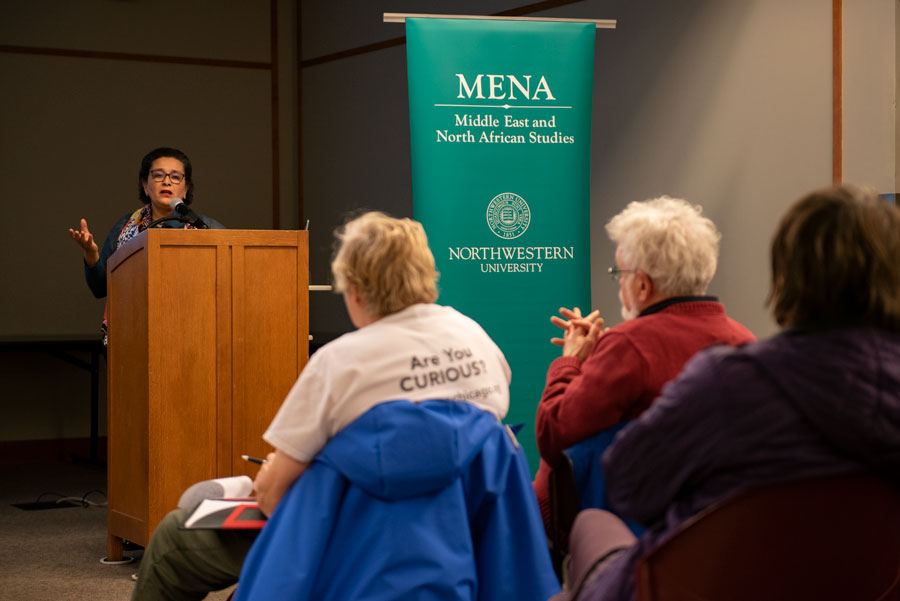Anthropologist and activist Jamila Bargach talks fog harvesting at EPL
Eva Herscowitz/The Daily Northwestern
Jamila Bargach speaks at Evanston Public Library Tuesday on her NGO, Dar Si Hmad for Development, Education and Culture. Through a fog harvesting system, the NGO has provided potable water for over 15 villages.
November 26, 2019
Thanks to her innovative fog collection project, anthropologist and human rights activist Jamila Bargach and her team have provided over 15 villages with direct water access in historically drought-ridden southwest Morocco.
Bargach spoke to a crowd of 30 about the NGO she co-founded — Dar Si Hmad for Development, Education and Culture — Tuesday at the Evanston Public Library. Northwestern’s Department of Anthropology and the Center for Water Research co-sponsored the talk.
Danny Postel, the assistant director of international and area studies at Northwestern, introduced Bargach and said she has “dedicated her life to serving under-resourced communities.”
Dar Si Hmad’s project, which launched in 2006 and finished in October 2018, is the largest functioning fog collection project in the world. The project fosters the independence of Amazigh women — many of whom are responsible for “water chores” in Ait Baamrane, a Berber region — by delivering potable water to their households.
In 2006, people living in Southwest Morocco were suffering from a severe drought, said Bargach, who has co-founded a shelter for women in Casablanca and spent decades organizing residents in Morcoccan slums and informal communities. As temperatures in the region neared 113 degrees Fahrenheit and water continued to dwindle, some Moroccans migrated to cities, while others were forced to compromise their hygiene and sell their livestock.
“Oftentimes, the families are forced to sell their animals, and it is viewed as a real tragedy for the families,” she said. “The relationship between the people and the animals is not only a source of livelihood — people really care about their animals. It’s a very symbiotic relationship.”
As men migrated from the arid southwest to cities to earn jobs with wages, women continued to perform tasks related to water collection, Bargach said. This meant spending an average of 3.5 hours a day finding water and bringing it home.
While prioritizing the well-being of their children, many women went thirsty and experienced heightened anxiety during the dry season, Bargach added.
“Women would go to the well and wait three, four hours,” she said. “They leave everyone at home sleeping, especially babies and small infants. There has been a horrible sense of anxiety for the young mothers.”
After experimenting with various fog harvesting techniques, Dar Si Hmad settled on CloudFisher, a fog collector that can withstand high-speed winds. The panels, which resemble meshed panes, trap fog and transform it into water.
Bargach said she hopes to challenge the notion that water is just a commodity, highlighting spiritual, personal and social purposes as well.
“We have just a functional relationship to it,” she said. “If you have a mystical relationship with water, it takes away this notion of the material. It is a source of life. In that way, securing it and respecting it and not thinking of it as a simple commodity is something that is important.”
Though her NGO has a small staff, Bargach said its has earned multiple awards and achieved international recognition.
She said inaccessibility to potable water isn’t limited Morocco or North Africa, highlighting other regions of the world facing similar challenges.
“This is something that happens everywhere in the world,” she said. “It’s not only in southwest Morocco. It’s not only in rural Alabama. It’s not only in Chile. It happens everywhere where the access to water is limited.”
Email: evaherscowitz2023@u.northwestern.edu
Twitter: @herscowitz



